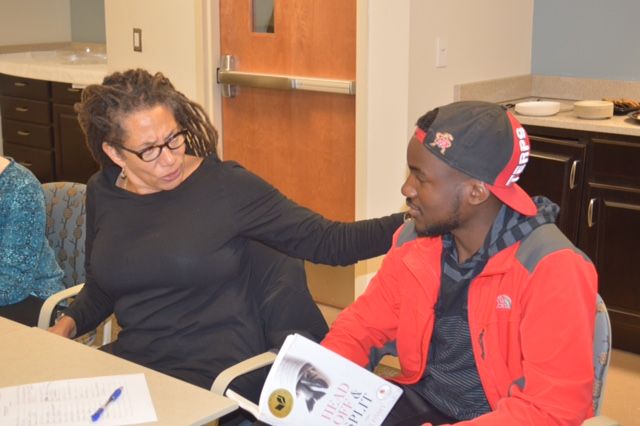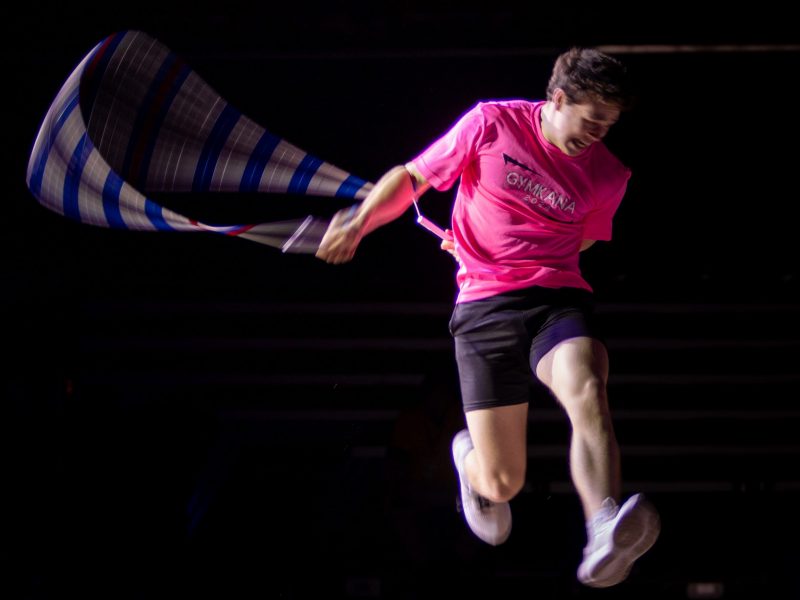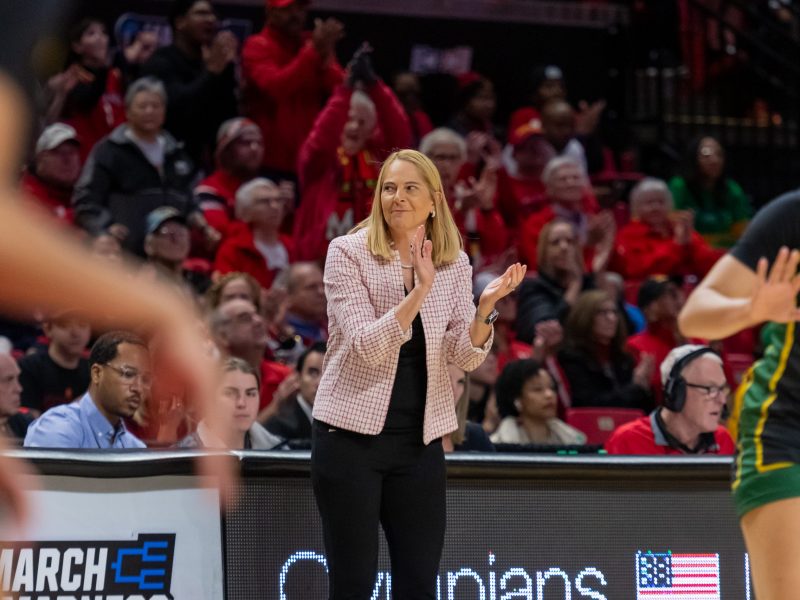
Poet and writer of this year’s First Year Book, Nikky Finney, talks to a student.
In 2013, the Clarice Smith Performing Arts Center commissioned an original poem from critically acclaimed poet Nikky Finney, whose book of poetry, Head Off & Split, won the National Book Award for Poetry in 2011. The poem, titled “The Battle of and for the Black Face Boy,” was written to be included in a series of events held at The Clarice to reflect on the anniversaries of the Civil Rights movement and the end of the Civil War. As a child of activists, Finney grew up with strong opinions on civil rights and racism, making the topic of the Trayvon Martin case the perfect choice for this new piece.
Finney visited the University of Maryland last week for a series of events that included the unveiling of her poem with a special-edition cover for the university at an exclusive reception Friday night at the David C. Driskell Center.
She also spoke with a great deal of students and staff regarding Head Off & Split, which was selected as this year’s First Year Book. The First Year Book is a 22-year-old program at this university designed to provide each first-year student with a piece of literature regarding a topic pertinent to conflicts of that year. Past topics have included climate change and war; this year’s book dealt mostly with racial conflicts and feminism.
“When you think about the First Year Book, you have to think about how 18-year-olds are going to want it, how they’re going to receive it,” said Lisa Kiely, assistant dean of undergraduate studies and one of the people involved in picking Finney’s book. “We’ve had a tough couple of years in this country, with issues of race, in particular black men being shot. It just seemed like [this book] would open up conversations. Poetry is a way to talk about history. I can tell you exactly everything that happened during [Hurricane] Katrina, but that’s my lens. Finney offers a new perspective on this.
“There are students in engineering classes who say ‘I have no use for poetry.’ Well, yeah they do. One of the reasons we have the First Year Book is that we learn to communicate as a community to talk about these challenging things. These students reading these books are the future. These are their problems to solve. Only now it’s coming to them in the form of poetry.”
Thursday morning, Finney met with entire classes of students to discuss the book. On Friday morning, she met with about 10 professors to discuss her work and how to use it both as inspiration and in a classroom for English and UNIV classes. That afternoon, she did something similar for a group of 30 or so students who signed up to sit down and talk with her, with a heavier influence on how they could learn to write as powerfully as she does in her work.
The highlight of the discussion was when Finney spoke on the hardships in the writing process. “The poem called ‘Left’ in the book, someone asked me if there was ever a harder poem to write,” said Finney. “I try not to put one poem against another, because they all happen in different ways, but that poem was probably the most difficult to write. It was my birthday week. I was in a celebratory mood and then Katrina hit. And it took the air out of everything.
“I knew I was going to write about it, because I can tell in my body when I’m going to write about something that I care about. I know I’m going to write about the black girl who [was in that police video] in South Carolina. Because I’m so mad, so enraged and so confused.
“So I passed by the television, which is something I try not to do because I think television changes the way you think about things. It’s other people’s perceptions about things, and it’s not always right. But I had to see what was going on in New Orleans.
“There was this black woman standing on a building holding a homemade sign that said, ‘Save me pleas.’ And she had misspelled the word ‘please.’ As a poet, I have to take everything into consideration when I’m writing a poem, because it’s really in the details that my poem becomes my poem and not yours. You might notice someone else and write about them. But this was my moment for entering the scene.
“I said to myself as I stood in front of the television, ‘Would they have rescued her if she had spelled that word right? Would they rescue her if she was another color?’ And that’s when my heart began to break, which is why I couldn’t write about it immediately, like I can’t write about this other piece immediately. My emotions are too high. The poem happens in the middle [of raw emotion and moving on], when you go back and you start thinking clearly about what you want to say.
“I think I waited probably months, but I was scribbling the whole time. Taking notes on her, on the height of the water … gathering the poem. The poet is a human being. I don’t have any more or less emotion than anybody else, but I have access to my feelings because they matter so much in the structure of the poem. But you don’t want to lose any of that. You’ll know when it’s time to write.”
Before leaving, Finney signed copies of her book and cover posters. She will be back on the campus this spring to meet with more students and teachers and to attend a special art gallery on the campus, Kiely said. The works on display will be student-produced, and they will all be in reaction to Finney’s poems.



